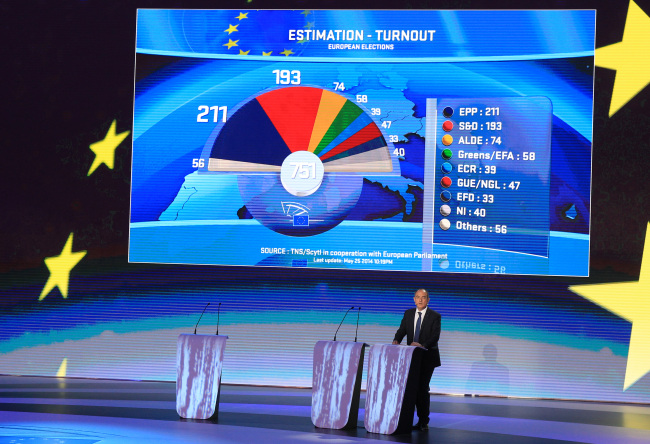BRUSSELS (AFP) ― France’s far-right National Front and Britain’s UKIP led a euroskeptic “earthquake” in EU parliamentary polls, sending shockwaves across Europe and beyond.
The EU Parliament’s own projections early on Monday showed the extent of the anti-EU breakthrough, with euroskeptic parties set to win around 140 seats in the 751-seat assembly.
The most emphatic results came from both sides of the British Channel.
In France the far-right National Front (FN) won over 25 percent of the vote, according to official figures.
The anti-EU mood also swept Britain where the anti-EU U.K. Independence Party (UKIP) looked set to score a historic election victory.
 |
| A graphic shows the estimated results of the European elections, at the European Parliament in Brussels on Sunday. (AP-Yonhap) |
UKIP leader Nigel Farage hailed “the most extraordinary result in British politics for 100 years” as his party secured over 27 percent of the vote with results from 10 of the 12 British regions declared.
“We have hit very hard,” he added, talking of a political “earthquake.”
The anti-EU Danish People’s Party was also victorious, while far right groups had strong showings in Hungary and Greece.
In Austria the right-wing Freedom Party also made big gains, coming in third with 20 percent of the vote.
Projections for the European Parliament as a whole showed the center-right umbrella group, the European People’s Party, holding on to its top spot with 212 seats, though it looks to have lost 62 in the process.
The Socialists were second with 186 seats, down from 196. The ALDE Liberals group would be third with 70 seats, ahead of the Greens at 55 and the left GUE/NGL with 45.
If confirmed, the FN victory in France would be the highest ever national vote garnered by the anti-immigration, anti-EU party led by Marine Le Pen who has promised to shake up the country and the EU.
It easily beat the center-right UMP on 20.6 percent, and humbled President Francois Hollande’s Socialists, which came a distant third with just under 14 percent.
The French people “no longer want to be ruled from outside, to have to submit to laws they did not vote for or to obey (EU officials) who are not subject to the legitimacy of universal suffrage,” Le Pen said.
There was better news for the pro-EU camp in Germany where Chancellor Angela Merkel’s conservative party won around 36 percent of the vote, while its coalition partner, the center-left Social Democrats, scored some 27 percent.
But even in the EU’s most powerful member state, the nay-sayers were not totally denied, with the anti-euro Alternative for Germany taking 6.8 percent of the vote, putting it above the threshold for seats just a year after the party was formed.
Eyes were also on the turnout, which has fallen every year since the first election in 1979, reaching a record low of 43 percent in 2009.
Even a minuscule improvement to 43.09 percent was therefore treated as a historic turning point by europhiles.
However, many of those voters came out to support anti-euro and anti-immigration parties who had tapped into growing voter frustration with the EU, saying Brussels has too much power and does not listen.
UKIP, a party with no seats in the British parliament, was two percent ahead of the second-placed Labour Party, the country‘s main opposition with the Conservatives of Prime Minister David Cameron trailing in third, though the results weren’t complete.
It had secured 23 EU parliamentary seats after 10 of the regions had declared ― 10 more seats than its total at the last European election in 2009.
Victory for UKIP would be the first time in over a century that a British election has not been won by either of the two mainstream parties of the day.
Left-wing parties performed strongly in Italy, Spain and Greece.
Italian Prime Minister Matteo Renzi‘s center-left Democratic Party (PD) pulled out a stunning win with 41.4 percent of the vote, well ahead of the anti-establishment Five Star Movement (M5S), according to early projections.
In Spain, the two mainstream parties, the ruling conservative Popular Party and the Socialist Party, lost ground to mostly smaller groups on the left.
The inroads made by the anti-EU and radical parties have stoked concern they could hold Parliament hostage, working against the EU from within, but analysts say such fears may be overdone.
For his part, European Commission head Jose Manuel Barroso called on the pro-EU groups, who “have overall won once again” to come together.
Faced by mounting hostility to the Brussels bureaucracy, which is seen as aloof, EU political leaders have worked hard to correct a so-called “democratic deficit.”
For the first time, the five main groups in parliament named candidates to be the next head of the powerful European Commission and sent them out on the campaign trail.
However it was not even clear if Parliament’s choice for head of the Commission will actually be selected.
Herman Van Rompuy, who chairs the European Council grouping of heads of state, has made it clear it was not ready to hand over that power so easily.

